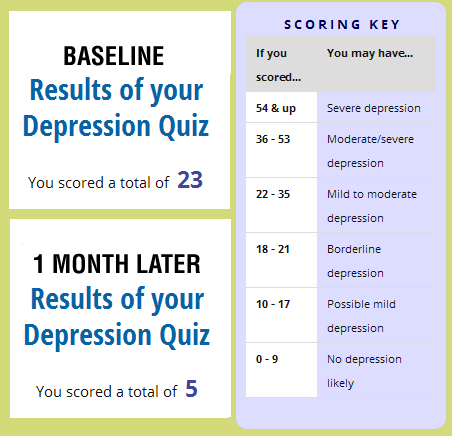 |

The speed of information in the modern age is unprecedented. On-goings across the world are immediately processed, evaluated and delivered to billions of people through TV, radio and the web - but is it making us sick? Given the salaciousness of bad events, leading to greater coverage, can the negativity wear down the psyche? A downtrodden Scientific AmeriKen explores the potential benefits of sticking one's head in the sand through attempted complete news avoidance.

Coming of a bit of news binging, it was suspected that an overdose of negativity was causing a loss of faith in the world. Therefore, the hypothesis of this experiment is that symptoms of this mild/minor depression can be alleviated by avoiding all news sources.

Baseline and endpoint depression evaluation was assessed at http://psychcentral.com/quizzes/depquiz.htm. This test contains a short survey of 18 questions that is used to provide a score between "no depression likely" and "severe depression". Following baseline assessment, all news sources were avoided as well as possible. This also included radio shows, Facebook and other social media websites as these may contain references to news stories. Following one month of news avoidance, endpoint depression assessment was completed. 

Following the initial survey, a score of 23 was attained; indicating that indeed mild to moderate depression was possible. One month later a retake of the same survey reveals a marked reduction in the depression index to a score of 5; indicating no depression likely.

Depression is a serious condition that carries significant health risks. There are a wide range of potential causes of depression and this current experiment explores whether news can be a contributing factor. The remarkable recovery by Scientific AmeriKen to a "no depression likely" state, by simple news avoidance, may signify that indeed a link between news consumption and depression indeed exists - an idea strongly supported here. A surprising finding, however, was realizing how entrenched the addiction was. Accidental viewings of news did occur on many occasions as news web addresses were, by habit, typed in and visited. This is not believed to have affected the experiment though as the website was immediately closed upon realizing the mistake, and this horrible addiction was eventually overcome. Additionally, it should be noted that the test used to determine depression was very straight forward and easy to figure out to "embellish" scores in either direction. Although Scientific AmeriKen attempts to remain true and honest to the survey and science, the impacts of the placebo effect may have played a role. Regardless, after one month of news freedom, Scientific AmeriKen is happy to say, "I feel great!".
Discuss this experiment and more science at ScienceChatForum.com!
|
 |

